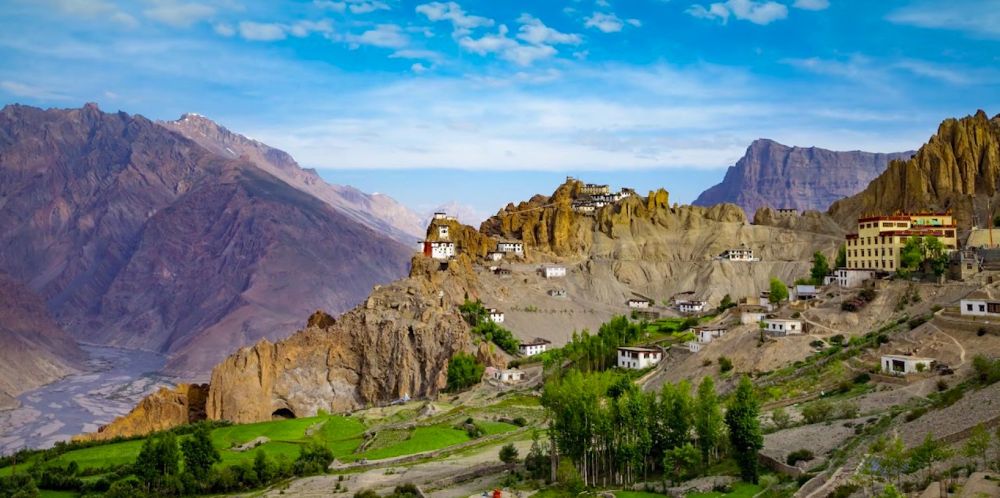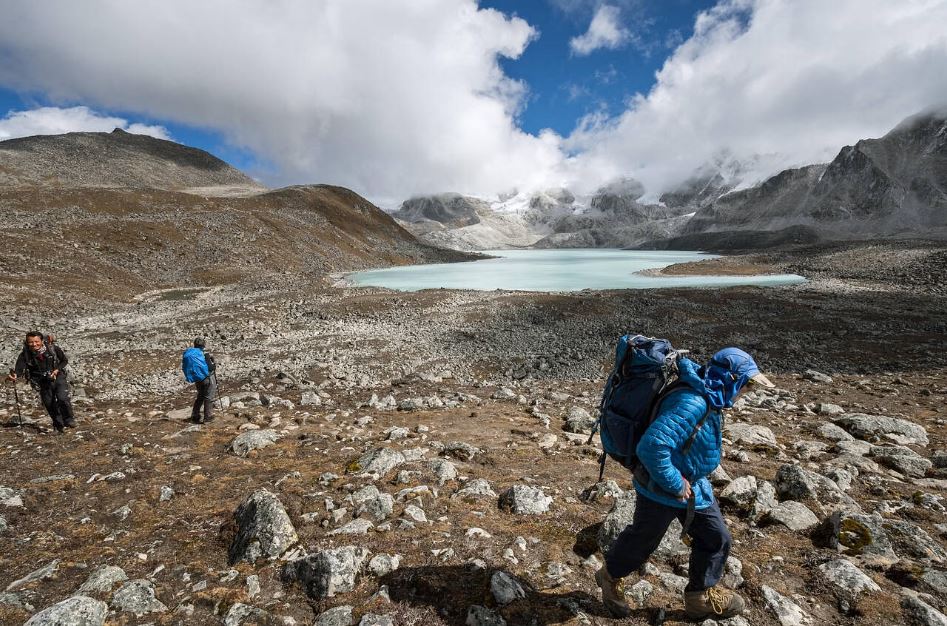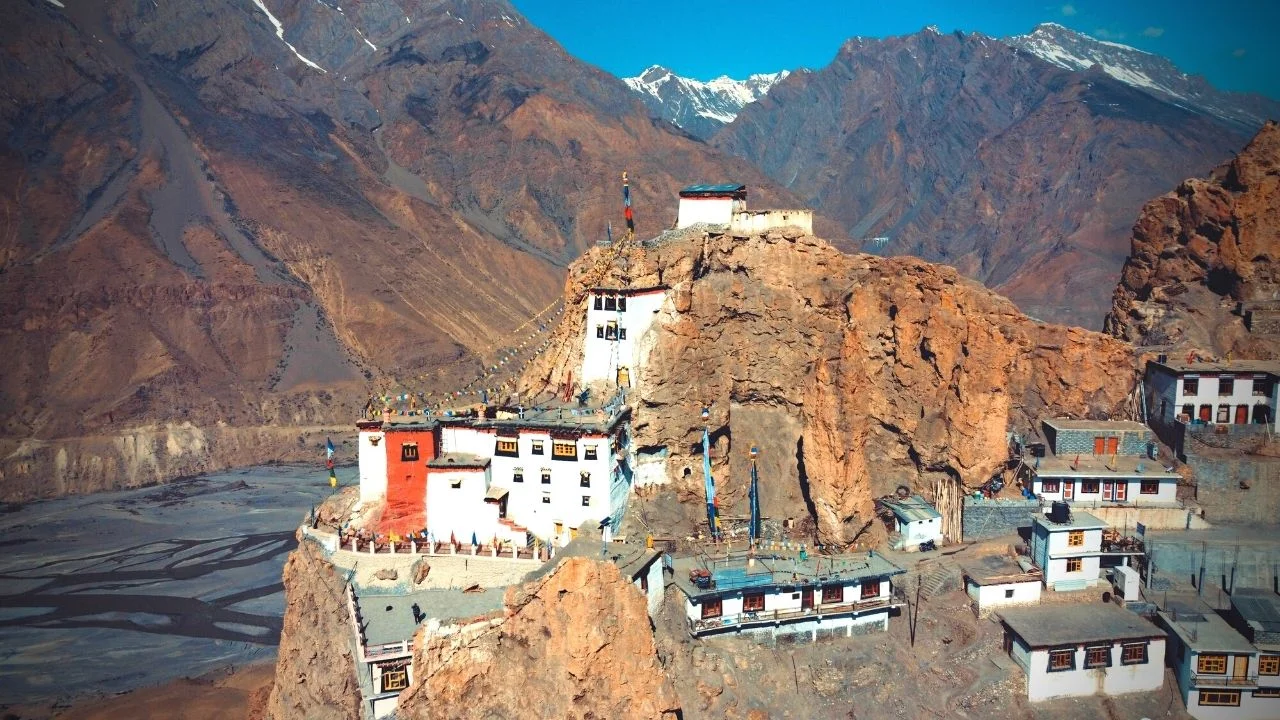Dhankar Monastery: The Cliffside Jewel of Spiti Valley
Historical Background Of Dhankar Monastery

The origins of Dhankar Monastery history trace back to the 12th century, when the monastery was built as both a spiritual center and a fortress. Long before modern roads reached the valley, Dhankar was the capital of Spiti, with a strategic vantage point that allowed it to watch over the valley below. The monastery’s position, perched on the cliff’s edge at nearly 3,900 meters, was as much about defense as it was about devotion. Above it sits the Dhankar Fort, whose ruins still whisper tales of battles, rulers, and monastic life.
Inside, the monastery preserves ancient murals, scriptures, and artifacts that reflect the valley’s Tibetan Buddhist heritage. Despite harsh winters and occasional landslides, the structure has endured, maintained by generations of monks and local villagers. It stands today not just as a building, but as a Buddhist pilgrimage site, a repository of the valley’s culture, and a testament to human perseverance in one of India’s most remote landscapes.
Architectural Marvel of Dhankar Gompa
Clinging to the cliff like a painting in three dimensions, Dhankar Gompa is a marvel of Himalayan architecture. Its multi-tiered structure rises sharply against the sky, with narrow staircases and wooden balconies that look almost impossibly delicate given the altitude. Built primarily from stone and mud-brick, the monastery is perfectly adapted to the harsh mountain climate: thick walls trap heat during frigid winters, while small windows shield the interiors from icy winds.
Inside, every corner tells a story. Intricately painted murals depict Buddhist deities, historical events, and local legends, their colors surprisingly vibrant despite centuries of exposure. The prayer halls resonate with chants, giving the space a living, breathing energy. Unlike larger, more commercialized monasteries, Dhankar Gompa retains a sense of intimacy—you feel the history under your fingertips and the devotion in every ritual performed by the resident monks.
Spiritual and Cultural Significance
The heart of Dhankar Monastery Spiti Valley lies not just in its walls but in its spiritual life. Monks rise before dawn, ringing bells and chanting prayers that echo across the valley, creating a serene soundtrack for visitors. The monastery hosts local festivals, where villagers gather to participate in rituals, traditional dances, and prayers, blending devotion with community bonding.
For centuries, it has been a center of learning, preserving manuscripts and texts that chronicle the Buddhist philosophy, local history, and Himalayan heritage. Pilgrims, trekkers, and cultural enthusiasts alike find themselves drawn here—not only to witness the rituals but to absorb the unique atmosphere that only a remote, high-altitude monastery can provide.
Trekking to Dhankar Lake

For adventure seekers, Dhankar Monastery trekking is an unforgettable experience. The trail to Dhankar Lake begins just above the village, winding through apricot orchards, dry mountain slopes, and occasional patches of snow. It’s a moderately challenging trek, taking about 4–5 hours to reach the serene, glacial lake.
The journey itself is as rewarding as the destination. Along the way, trekkers encounter Himalayan ibex, colorful wildflowers, and panoramic views of the valley below. The lake reflects the surrounding peaks like a mirror, offering a perfect spot for rest, reflection, and photography. Proper acclimatization is essential—at nearly 4,000 meters, the air is thin, and even a short climb can leave you breathless. Experienced guides often accompany visitors, sharing stories of local legends and the monastery’s history along the trail.
Photography at Dhankar Monastery
Photographers find Dhankar Monastery photography endlessly satisfying. The interplay of light and shadow on the whitewashed walls, the fluttering prayer flags, and the backdrop of the deep Spiti Gorge create naturally cinematic scenes. Early morning or late afternoon offers the softest light, illuminating the intricate murals while highlighting the rugged textures of the cliffside.
Inside, close-up shots capture the detailed artwork, while exterior frames show the monastery’s dramatic perch against vast Himalayan vistas. Autumn is particularly photogenic: clear skies, crisp air, and golden sunlight make every angle picturesque. Travelers often describe the experience as painting with a camera—every step reveals a new composition waiting to be captured.
How to Reach Dhankar Monastery
Getting to Dhankar Monastery is an adventure in itself. The monastery is accessible by road from Kaza, the main town of Spiti Valley. Travelers can hire taxis, shared cabs, or self-drive vehicles along the scenic route that passes through Lahaul and Spiti tourism hotspots. The winding mountain roads offer spectacular views but require careful driving due to narrow passages and occasional landslides.
For those flying in, the nearest airport is in Kullu, followed by a long yet breathtaking road journey. While public transport is limited, local guides and drivers are highly recommended, not just for safety but for stories, insights, and tips about the region that you won’t find in any guidebook.
Dhankar Monastery Altitude & Timings
At 3,894 meters above sea level, Dhankar Monastery altitude gives it a commanding presence over the Spiti Valley. The high elevation means visitors should take time to acclimatize and stay hydrated to avoid altitude sickness. The monastery typically opens to visitors from 9 AM to 4 PM, with monks performing early morning rituals and prayers. Seasonal variations may affect timings, especially during the harsh winters when snow can block roads, so checking locally before traveling is wise.
Things to Do in Dhankar

Besides exploring the monastery itself, there are several things to do in Dhankar that make a visit unforgettable. Hiking to Dhankar Fort above the monastery provides historical context and breathtaking views of the valley below. Trekking to Dhankar Lake is another must-do adventure, offering both physical challenge and serene natural beauty. Cultural enthusiasts can time their visit to coincide with local festivals or observe monastic rituals, while casual travelers can stroll through Dhankar Village Spiti and experience the local way of life.
Nearby Attractions
While Dhankar Monastery is the crown jewel of the area, there are other fascinating places nearby. Pin Valley National Park is perfect for wildlife spotting and nature walks. Other ancient Spiti Valley Monasteries like Tabo and Kye Monastery provide additional insights into the region’s spiritual heritage. Exploring these locations along with small villages like Gue and Komic enriches the journey, combining adventure, culture, and scenic wonder in one itinerary.
Conclusion
Dhankar Monastery is more than a historical site or trekking destination—it’s an experience. The monastery, perched dramatically on the cliffside, embodies centuries of devotion, resilience, and Himalayan culture. Visitors leave with more than photographs; they carry stories of monks’ chants echoing across valleys, the thrill of high-altitude trekking, and the serene beauty of a place untouched by time. For travelers seeking a mix of adventure, culture, and spiritual insight, Dhankar is a must-visit in Spiti Valley.
Get In Touch With Our Travel Expert




